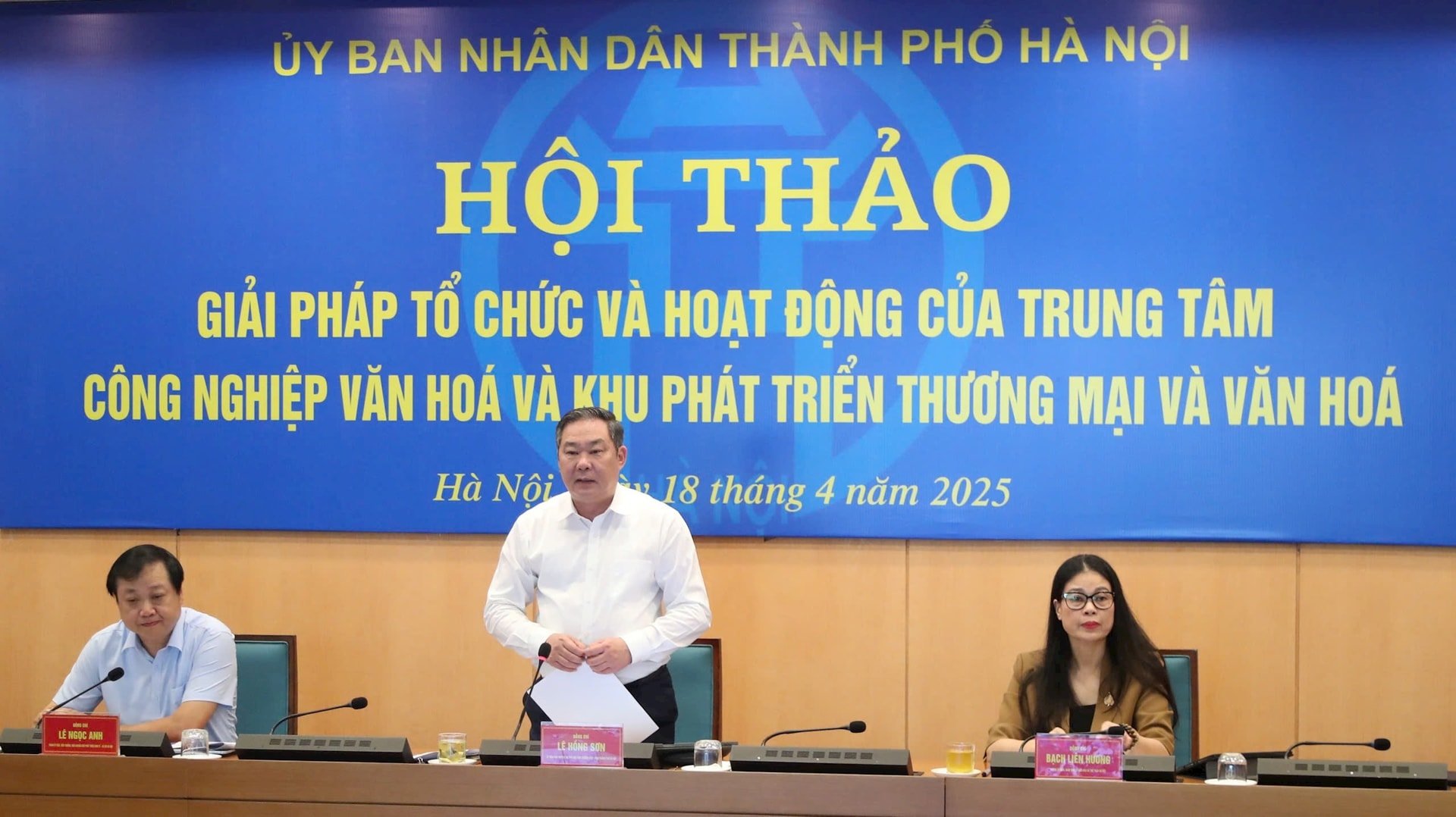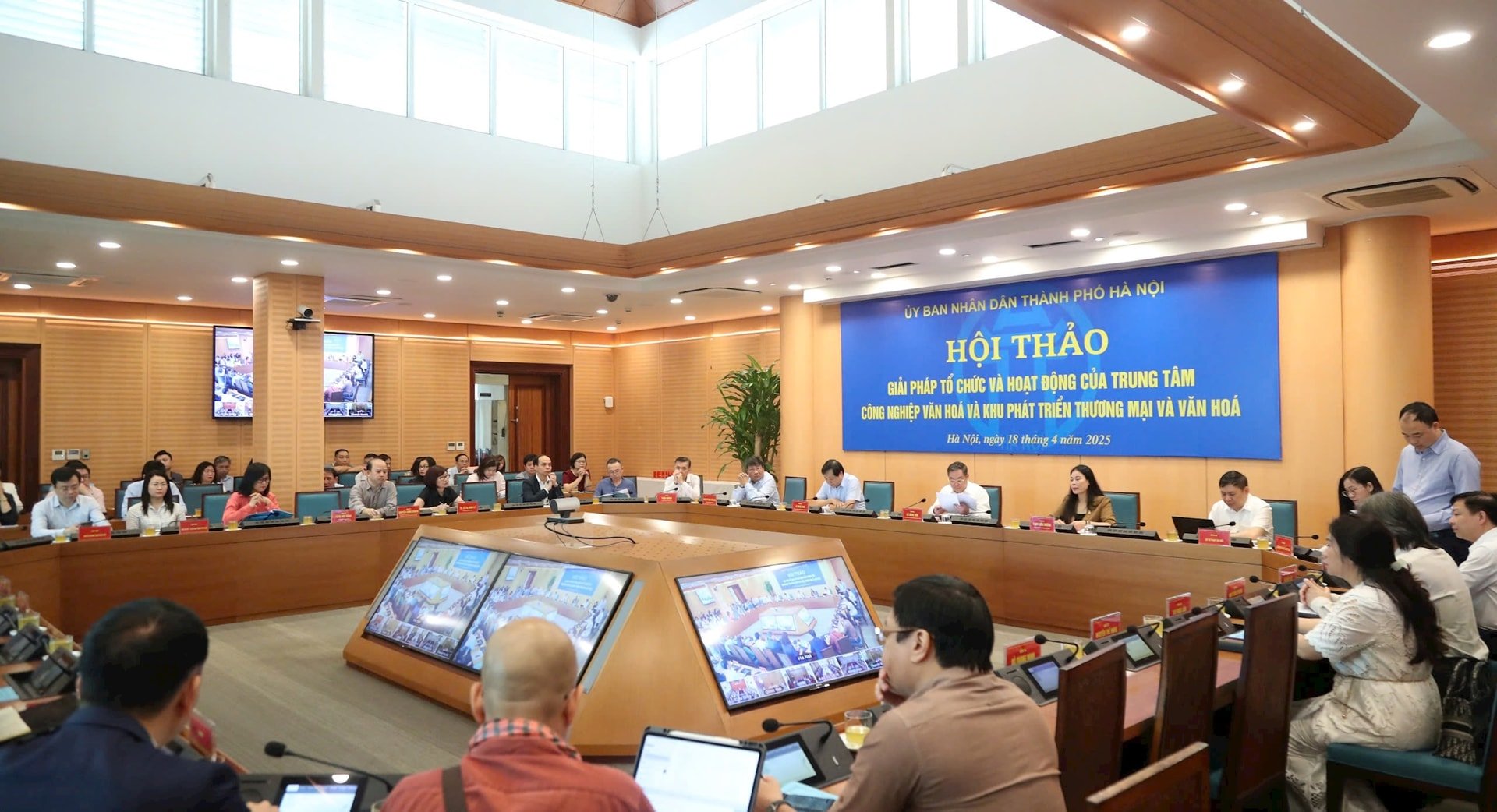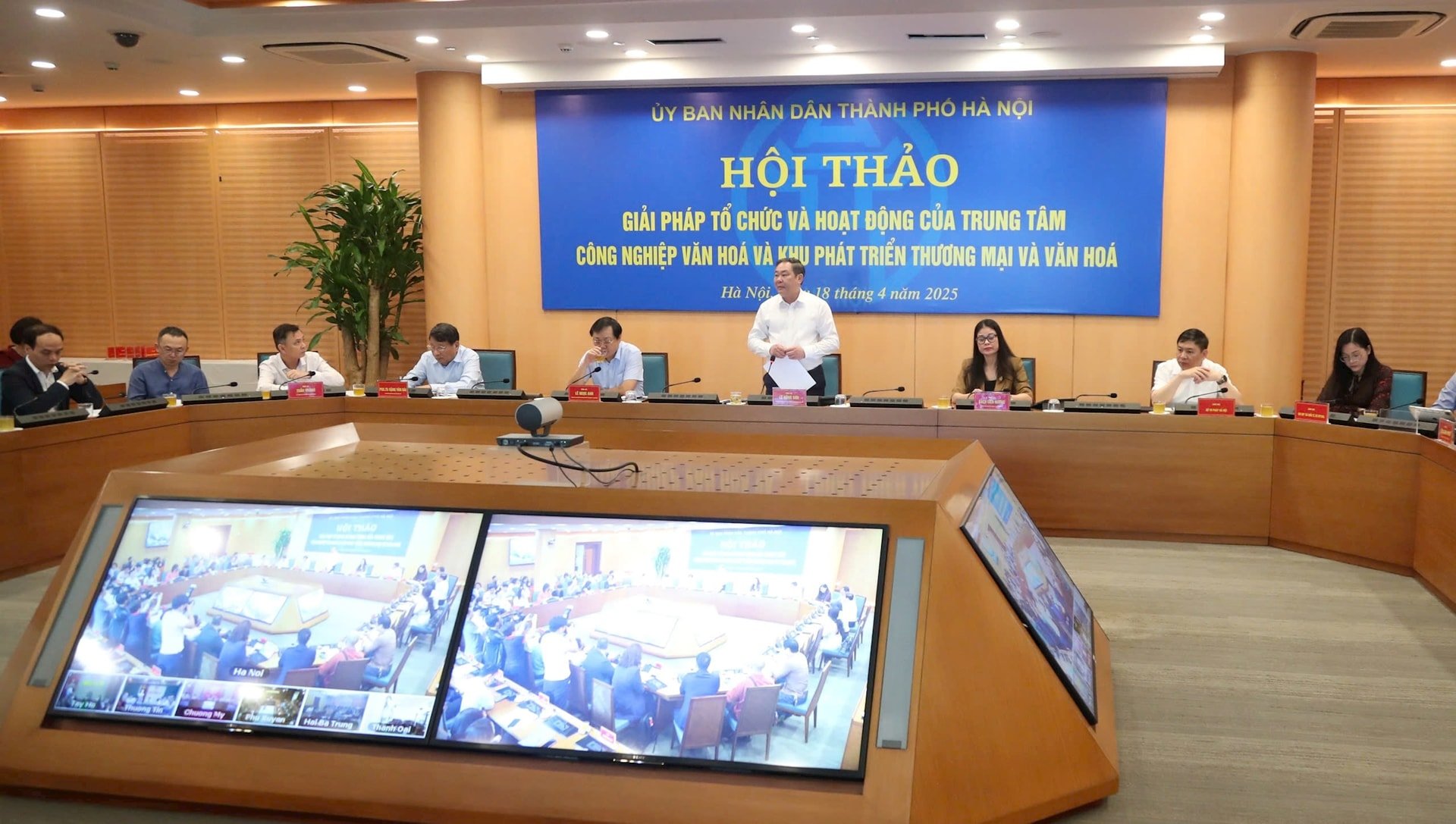Attending the workshop were: Mr. Le Hong Son, Member of the Standing Committee of the Hanoi City Party Committee and Permanent Vice Chairman of the Hanoi City People's Committee, who chaired the meeting; leaders of units of the Ministry of Culture, Sports and Tourism; leaders of departments, agencies, and sectors; representatives from several districts, towns, and cities; as well as scientists , representatives of craft villages, artisans, artists, and neighborhood groups…

Igniting the aspirations of the Capital City
In his opening remarks at the workshop, Standing Vice Chairman of the Hanoi People's Committee Le Hong Son stated that Hanoi is currently seeking opinions on draft proposals for the construction of a Cultural Industry Center and a commercial-cultural development zone to implement the Capital City Law (2024), aiming to facilitate the development of the capital city. According to the plan, at the 4th session of the People's Council, the city will consider issuing these two resolutions, creating momentum for the development of the capital city based on using culture as a driving force for socio -economic development.
Currently, along with the rest of the country, Hanoi is facing the demand for development, achieving double-digit growth, and needs to develop even further in the coming years. To achieve sustainable and green growth, Hanoi needs to maximize its cultural potential and advantages while preserving its identity and fostering innovation.
Comrade Le Hong Son emphasized: The development of the cultural industry is not new; many countries in the region have developed it strongly, such as China, South Korea, Japan, Singapore, and Thailand... However, for Vietnam in general and Hanoi in particular, the development of the cultural industry still has many issues that need to be researched to ensure high feasibility and practicality.
"Hopefully, Hanoi will have more cultural and creative centers to attract all segments of society, especially young people, to participate in creative activities in many fields. We will implement this in a spirit of moderation, but also without striving for perfection," Comrade Le Hong Son shared.
Contributing to the workshop, Director of the Institute for Economic and Social Development Research, Le Ngoc Anh, stated that the development of the cultural industry (or creative industry) has been and continues to be a global trend, a crucial, comprehensive, and sustainable development strategy that attracts international cooperation, creates a competitive advantage, and makes a significant contribution to GDP.

The amended Capital City Law includes provisions promoting cultural development, fostering the aspiration for "Cultural Heritage - Civilization - Modernity"; effectively exploiting geopolitical and geo-economic advantages, natural conditions, and development resources; and preserving and promoting the tangible and intangible cultural values of Thang Long - Hanoi. The Capital City Law also allows Hanoi to develop cultural industry centers on the sandbanks and islets of the Red River; focusing on five types of spaces, including: Cultural and creative spaces (expanding historical relic spaces, creative spaces in line with UNESCO's creative city orientation); and public spaces (especially green spaces, protecting river and lake spaces, and water landscapes).
Mr. Le Ngoc Anh proposed that Hanoi improve mechanisms and policies (land incentives, urban planning, taxes, etc.), create a legal framework for developing creative spaces and the cultural and creative industries with strengths; select key areas and support cultural and creative businesses; invest in transportation infrastructure serving these centers; diversify public-private partnership models; and update planning to align with the direction of the cultural and creative industries.
Lessons from international models
At the workshop, domestic and international experts presented various models of cultural industry development from other countries, drawing lessons for Hanoi.
Emmanuel Cerise, Head of the Région Ile-de-France regional office in Hanoi, stated: In France, cultural management is linked to economic development. Currently, the cultural industries contribute approximately 110 billion euros to the French economy. Across the EU, the cultural industries rank third after construction and hospitality. The cultural industries sector includes art, advertising, television, journalism, film, video games, etc.
Mr. Cerise argued that Hanoi, with its large administrative area and significant cultural appeal in the suburbs, could effectively develop cultural and industrial centers. Hanoi should develop both state-managed and privately-run centers. To promote these centers, investment in transportation infrastructure is needed, along with the construction of bus routes connecting heritage sites and providing resources for passengers.
Drawing on his experience organizing cultural events in France, Emmanuel Cerise suggested that Hanoi should regularly organize events such as the Creative Design Festival and heritage promotion activities at the villa at 46 Hang Bai Street. "We are ready to partner with Hanoi in preserving and promoting heritage and building an effective cultural and industrial center," said Emmanuel Cerise.

Meanwhile, Ms. Pham Thanh Huong, Head of the Culture Department, UNESCO Office in Hanoi, stated that Hanoi has many old urban heritage sites that have been revived through creative festivals, such as the Hang Dau Post Office and the Gia Lam Railway Factory… This represents great potential for developing a cultural and industrial center.
Ms. Pham Thanh Huong proposed repurposing old industrial zones and abandoned industrial heritage sites into cultural and industrial centers – a cost-effective solution that also inspires creativity. Additionally, she suggested developing a multidisciplinary center encompassing culture, creative design, and technology, encouraging innovation and creating experiential spaces.
As someone involved in building many cultural and industrial park models in Hanoi, architect Doan Ky Thanh shared the criteria for constructing new models alongside reusing old buildings. According to him, for effectiveness, a cultural and industrial park should have an area of 1-5 hectares, attract about 60-80 stalls, and have a common space designed to be friendly and foster community connection.
Promoting Public-Private Partnerships
At the workshop, delegates contributed their opinions to the draft Resolution, suggesting that the city needs to further clarify the resources for developing the cultural industry, especially from foreign businesses; build a more specific mechanism for leasing public assets; and add policies to support creative entities in cultural industry activities based on cultural spaces and cultural heritage, closely linked to the community.
Concluding the workshop, Standing Vice Chairman of the Hanoi People's Committee Le Hong Son affirmed that the development of the cultural industry is one of the city's important policies aimed at transforming culture into a driving force for socio-economic development. Under current conditions, the city will prioritize the reuse of old factories, offices, and industrial zones for renovation and functional transformation to serve cultural development.
In addition, the city has issued a Resolution on joint ventures, partnerships, and franchising… This provides a basis for units to promote the development of cultural industries in this form. “The city will prioritize promoting public-private partnerships (public investment, private management), fostering creativity and innovation from the private sector,” said Le Hong Son, Standing Vice Chairman of the City People's Committee.
Furthermore, Comrade Le Hong Son noted the need to focus on specialized planning, avoiding overlaps, in order to maximize the mobilization of resources for development. In its role as a guiding force, Hanoi will concentrate on supporting technology, communication, international cooperation, and market development. The development of the cultural and technological center needs to be implemented according to a roadmap with appropriate and solid steps.
Source: https://hanoimoi.vn/xay-dung-trung-tam-cong-nghiep-van-hoa-luc-day-de-phat-trien-thu-do-699439.html






![[Photo] Close-up view of the most modern multi-level boarding school in the border region.](/_next/image?url=https%3A%2F%2Fvphoto.vietnam.vn%2Fthumb%2F1200x675%2Fvietnam%2Fresource%2FIMAGE%2F2026%2F01%2F31%2F1769825352253_z7485066371145-45cccc741d77ee89a371005bcaa2e314-7270-jpg.webp&w=3840&q=75)


















![[Photo] General Secretary To Lam receives the Special Envoy of General Secretary and President of China Xi Jinping](/_next/image?url=https%3A%2F%2Fvphoto.vietnam.vn%2Fthumb%2F1200x675%2Fvietnam%2Fresource%2FIMAGE%2F2026%2F01%2F30%2F1769759383835_a1-bnd-5347-7855-jpg.webp&w=3840&q=75)
































































![OCOP during Tet season: [Part 3] Ultra-thin rice paper takes off.](/_next/image?url=https%3A%2F%2Fvphoto.vietnam.vn%2Fthumb%2F402x226%2Fvietnam%2Fresource%2FIMAGE%2F2026%2F01%2F28%2F1769562783429_004-194121_651-081010.jpeg&w=3840&q=75)


![OCOP during Tet season: [Part 2] Hoa Thanh incense village glows red.](/_next/image?url=https%3A%2F%2Fvphoto.vietnam.vn%2Fthumb%2F402x226%2Fvietnam%2Fresource%2FIMAGE%2F2026%2F01%2F27%2F1769480573807_505139049_683408031333867_2820052735775418136_n-180643_808-092229.jpeg&w=3840&q=75)





Comment (0)